Awara Natural Hybrid Mattress review: Sustainable slumber at a fantastic value
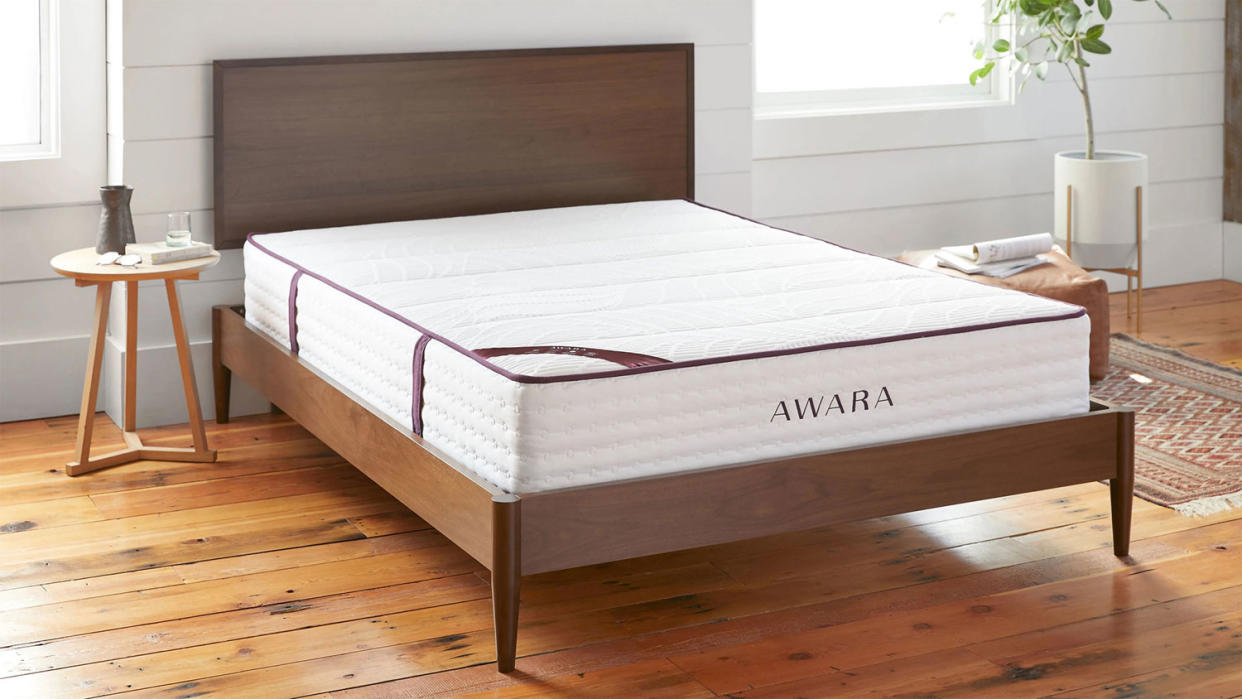
Awara Natural Hybrid mattress: two-minute review
The Awara Natural Hybrid mattress is something of an anomaly among latex beds due to its affordable price. Most of today's best organic mattresses are expensive, but the Awara consistently sits in the mid-range price bracket – a queen size goes for less than $950 during regular sales. But does this affordable natural mattress have a glaring compromise in quality? Quite the contrary – it's an impressively durable bed.
I slept on a twin Awara mattress and assembled a panel of five diverse testers to help me assess its features. Our collective verdict? The Awara ranks among the best mattresses for those who favor a firmer sleeping surface with gentle pressure relief. My full review is below but if the Internet has spoilt your attention span, here's the two-minute version...
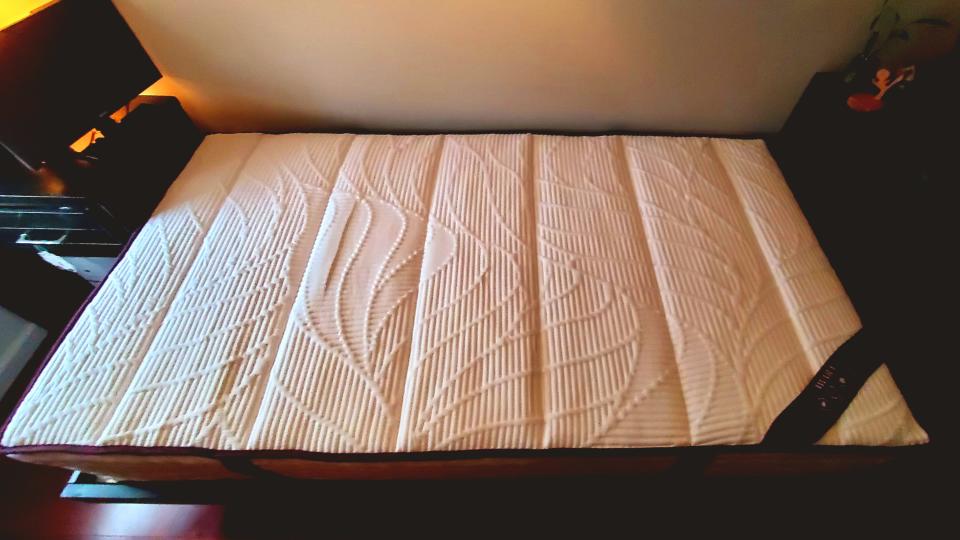
The Awara is a mattress in a box constructed of 8-inch springs, two inches of Rainforest Alliance-certified Dunlop latex, and a blend of organic cotton and New Zealand wool on top. Setup is seamless – and four side handles make moving the mattress a much less taxing task. The Awara boasts a number of highly-regarded third-party environmental and safety certifications to add to its eco-friendly cred.
When I first lay on the Awara, I was shocked by its firmer surface, but its latex comfort layer immediately molded to the shape of my body for ample support and just enough pressure relief – no matter if I rested on my side, stomach, or back. Everyone in my testing panel found it comfortable but side sleepers who crave more cushioning, as well as sleepers under 130lbs, may find it too unyielding.
Good news if you're prone to overheating at night (like me): the Awara is one well-ventilated mattress. It's not a specialty cooling mattress, but latex, cotton, and wool are some of the most breathable materials on the planet. The individually wrapped coils help keep the air flowing, too.
Edge support is excellent so you can sprawl out or sit on the sides or corners without fear of falling off the bed. However, Awara's one area of weakness is motion isolation. The buoyant latex and springy coils make for a bouncy, responsive bed. Couples will be more inclined to feel each other's movements, which could lead to frequent and unpleasant nightly wakeups. On the other hand, solo sleepers who switch positions during the night will love it.
The amenities are impressive. Awara includes a one-year sleep trial plus a forever warranty with purchase. Returns are also free, and the brand will help you donate it to charity or responsibly dispose it.
Awara mattress review: materials & design
A 10-inch hybrid mattress with three layers
Uses Rainforest Alliance-certified Dunlop latex
Includes four side handles for easy moving
There are three primary layers that make up the Awara Natural Hybrid mattress: a sturdy base of 8-inch individually wrapped coils, a 2-inch comfort layer of Rainforest Alliance-certified Dunlop latex, and a soft cover that's a blend of organic cotton and New Zealand wool. Combined, these layers offer a responsive and breathable sleep surface, with gentle contouring to ease your joints. Latex is often used in organic mattresses as a natural alternative to synthetic foams (see how the two compare in our memory foam versus latex mattress explainer). Bonus: latex is hypoallergenic so it's also great for sleepers with asthma or airborne allergies.
Setup is simple – just remove it from the box, unroll it on your bedframe, and remove the plastic (a process made easier thanks to the included credit card-sized cutter). Everything is structurally kept in place via a shift-resistant bottom cover. Four reinforced side handles will make the mattress much easier to move, which will be useful if you move house often.
Awara's commitment to producing an eco-friendly bed is highlighted by its array of environmental certifications, which include the aforementioned Rainforest Alliance, Standard 100 by OEKO-TEX, UL GREENGUARD Gold, and the Forest Stewardship Council. These standards ensure that the Awara's materials are sustainably sourced, low in volatile organic compounds (VOCs), and free from toxic chemicals. The Awara is also a fiberglass-free mattress; it uses a chemical-free flame retardant.
Design score: 4.5 out of 5
Awara mattress review: price & value for money
Never sold at MSRP, sits in the mid-range price bracket
One of the cheapest and best value natural mattresses around
Full year's trial and forever warranty are very generous
Like many bed brands, Awara runs a perpetual discount; you'll never have to pay full MSRP. Based on the regular discounted price, the Awara Natural Hybrid sits in the mid-range price bracket, with a queen size costing around $999. That makes it one of the cheapest natural mattresses around, and excellent value for money.
Deals on the Awara don't tend to fluctuate as regularly as they do with other sleep brands, but if it is going to unveil an especially good price, it'll be for the Black Friday mattress deals in November.
Awara is the natural mattress brand within the Resident Home umbrella, which also includes mattress heavyweights Nectar and DreamCloud. As such, you'll get basically the same, ultra-generous package of extras, including a full year's trial period and forever warranty. All of Resident's brands shine when it comes to value for money.
Value for money score: 5 out of 5
Awara mattress review: comfort & support
A firm (8 out of 10) mattress with subtle contouring
Offers ample support and comfort for most sleepers
Side sleepers and petite individuals may want a plusher bed
In addition to myself (a 5ft 4, 140lb side/stomach sleeper with back pain) I also asked five other adults to sleep on the Awara mattress. We have diverse body types and sleep preferences, which afforded me a broader look at how well this organic hybrid mattress performs.
Awara calls its mattress 'luxury firm,' or a 7 out of 10 on the firmness scale – but my group collectively rated it an 8 out of 10. While some of us initially found it a bit too unyielding, we appreciated how quickly the Dunlop latex subtly contoured our bodies, offering just enough pressure relief without significant sinkage. It ranks amongst the best firm mattresses I've tested.
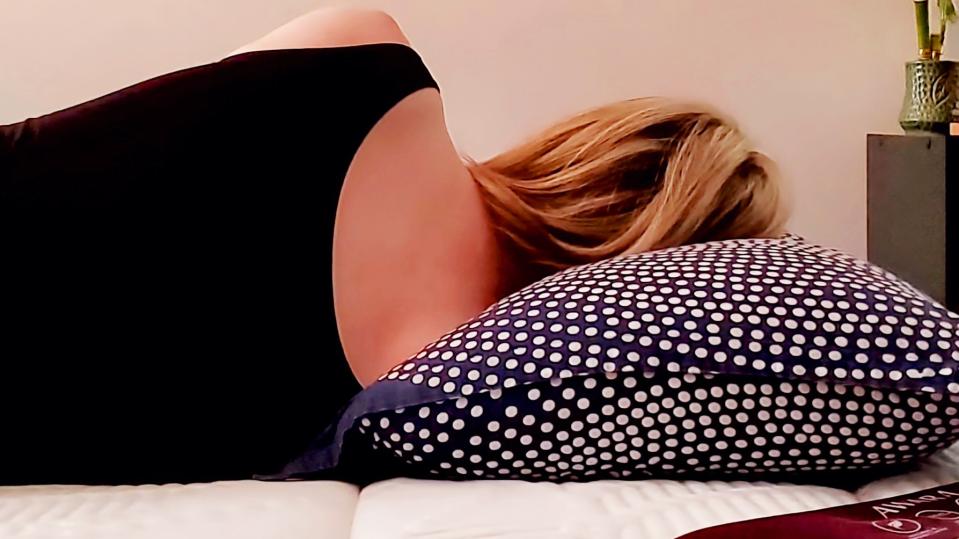
My lone back-sleeping participant said he felt like he was floating on top of the mattress yet adequately supported. Meanwhile, the side sleepers in my panel (myself included) were comfortable on the Awara – despite its firmer-than-average surface, all of us felt just enough give along our shoulders and hips. Even the pregnant side sleeper in my group liked how the Awara gently cradled her belly.
As the only combi sleeper among all the testers, shifting from my side to my stomach was effortless thanks to the responsiveness of the Awara's Dunlop latex and springs. Plus, when resting on my front I didn't feel my pelvis dip below the rest of my body, helping me avoid my nagging lower back pain.
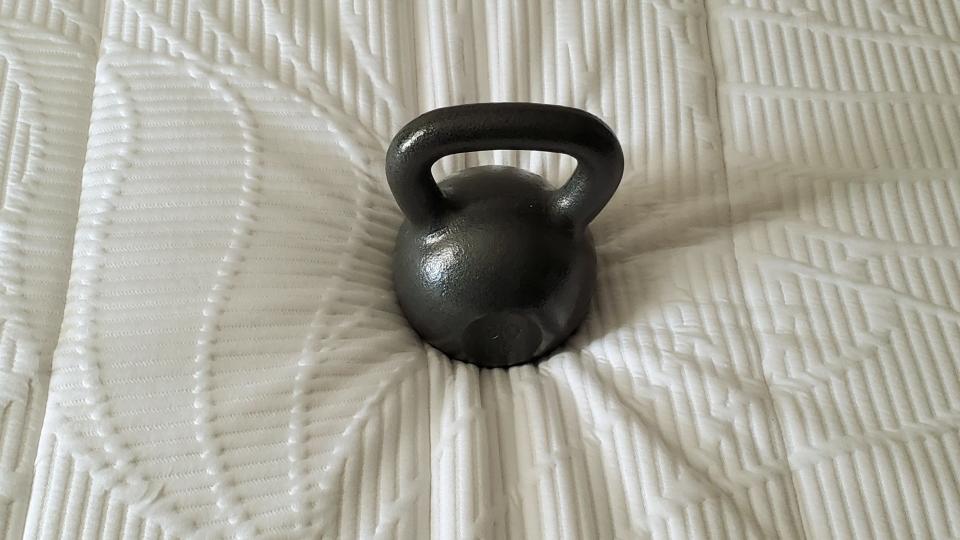
To further test the Awara's pressure relief, I placed a 50lb weight at the center of the mattress. This created a minimal dip (about an inch), and the bed quickly returned to form once I removed the weight. This assessment aligns with the minimal sinkage we human testers experienced.
While everyone in my testing group found the Awara's comfort to their liking, side sleepers who prefer a plusher feel and smaller-framed people who weigh under 130lbs might think it's too firm. For them, a memory foam mattress (or a memory foam hybrid) may be a better fit.
Comfort score: 4.5 out of 5
Awara mattress review: Performance
Excellent temperature regulation – good for hot sleepers
Too much motion transfer so not ideal for couples
Edges are sturdy for sitting and sprawling
I slept on a twin Awara Natural Hybrid Mattress for one month, during which I tested it in all key areas of performance according to TechRadar's mattress methodology. Here's how it fared...
Temperature regulation
I slept on the Awara mattress in the wintertime, so the real test here was to see how well it could regulate my body temperature upon cranking the heat and layering the fabrics. (I'm also prone to overheating at night, regardless of the season.)
Between latex's natural ability to draw away heat and the airflow created by the layer of coils, I didn't break a sweat once and remained perfectly cozy, even on the coldest nights. The organic cotton and New Zealand wool cover was not only lusciously soft, but it did a stellar job of wicking away moisture, too.
The Awara may not be a proper cooling mattress, but given the breathability of its materials, I think it's a sound choice for sleepers who don't want night sweats or hot flashes to keep them up at night.
Temperature regulation score: 4 out of 5
Motion isolation
The Awara is a remarkably bouncy, responsive mattress. This appeals to me as a solo sleeper who switches positions at night. However, anyone who shares a bed with their partner, kids, and/or pets will feel less enthused.
To gauge the Awara's motion isolation on my twin-size bed, I conducted a drop test using an empty wine glass and a 10lb weight. Mimicking the actions of a restless partner or a lively pet, I simulated three common bed disturbances: tossing and turning, getting in and out of bed, and jumping on the bed. I dropped the weight from 4, 8, and 12 inches above the bed to represent each scenario, respectively, and measured the effect roughly 25 inches away from the wine glass.
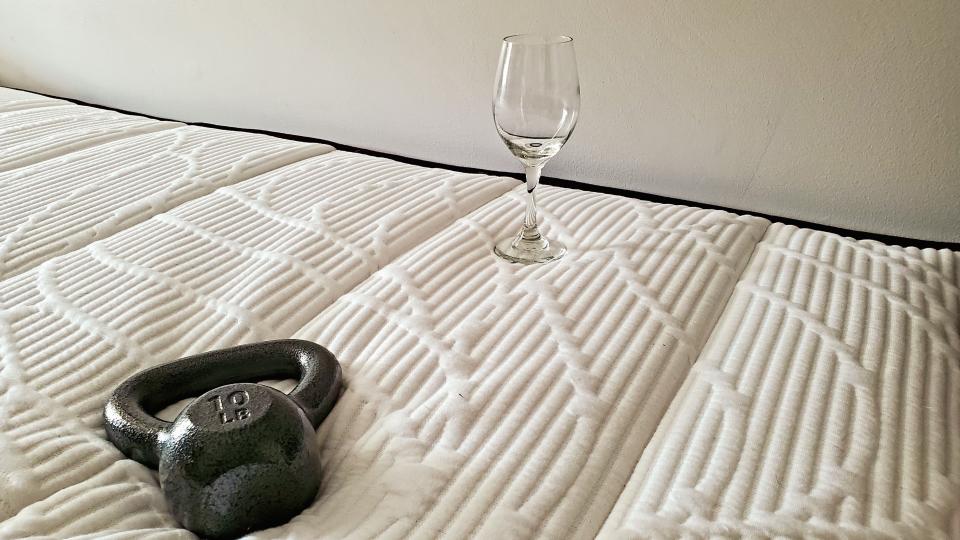
The wine glass didn't topple too much but I did notice the surface dip slightly beneath the glass. More telling was the weight itself, which bounced several times before settling into the mattress. Given the natural buoyancy of latex, these results didn't surprise me.
Thus, the Awara isn't the best choice if you don't want to be disturbed by your partner's movements – whether they fidget a lot in their sleep or operate on a different schedule than you do. For an organic mattress with superb motion transfer properties, read TechRadar's Avocado Green mattress review.
Motion isolation score: 3 out of 5
Edge support
Sturdy edges are essential for any mattress, regardless of size. Whether you tend to roll towards the edges in your sleep or sit on the side prior to getting up out of bed, you don't want to feel as if you'll topple overboard.
Unfortunately, some brands skimp on edge support, especially for solo sleeper beds. However, this isn't the case with the Awara. My testers and I experienced solid support whether we sat on the corners or the sides. Although the mattress did obviously compress under our weight, we never felt unstable or at risk of sliding off.
I also placed a 50lb weight along the middle perimeter, measuring about an inch of sinkage – the same amount I observed when I placed the weight at the dead center of the mattress. Ideally, the edges shouldn't dip lower than the middle, so the Awara gets a passing grade in this area.
The Awara ranks among the best mattresses I've tested for robust edge support. It's proof that stable edges are possible for even the smallest of beds.
Edge support score: 4.5 out of 5
Awara Natural Hybrid mattress specs
Should you buy the Awara mattress?
Buy it if…
✅ You're a fan of firm beds: The Awara's firm surface will appeal to to front and back sleepers – and even side sleepers who eschew overly plush beds will find it comfortably supportive.
✅ You use every inch of your mattress: The Awara's sturdy sides and corners will sufficiently accommodate those who like to sprawl out or need a stable edge to sit on. If you're prone to rolling toward the edge in your sleep, don't worry about falling overboard.
✅ You care about saving the planet (and your money): Organic mattresses often command a higher cost but the Awara's mid-range price makes eco-friendly sleep much more accessible. Add in a year-long sleep trial and a lifetime warranty and you have an tremendous value.
Don't buy it if…
❌ You share a bed: The Awara's bouncy, responsive surface is great for solo sleepers who toss and turn at night – but this could be bothersome for couples or anyone who shares a bed with a lively pet.
❌ You like the sink-in sensation of memory foam: Sleepers seeking the deep embrace of memory foam won't find it here. The Awara's latex comfort layer imparts a firmer touch with limited contouring. TechRadar's best memory foam mattress guide provides a range of alternatives at different price points, but in the #1 spot you'll find the Nectar memory foam mattress.
❌ You weigh under 130lbs: Firmness is a matter of personal preference but if you're a smaller-framed individual who weighs under 130lbs, the Awara's firmness and limited give might be too rigid for your liking. Our organic mattress guide has models in a range of firmness profiles, including some that fall into the 'plush' category, like the WinkBeds EcoCloud hybrid.
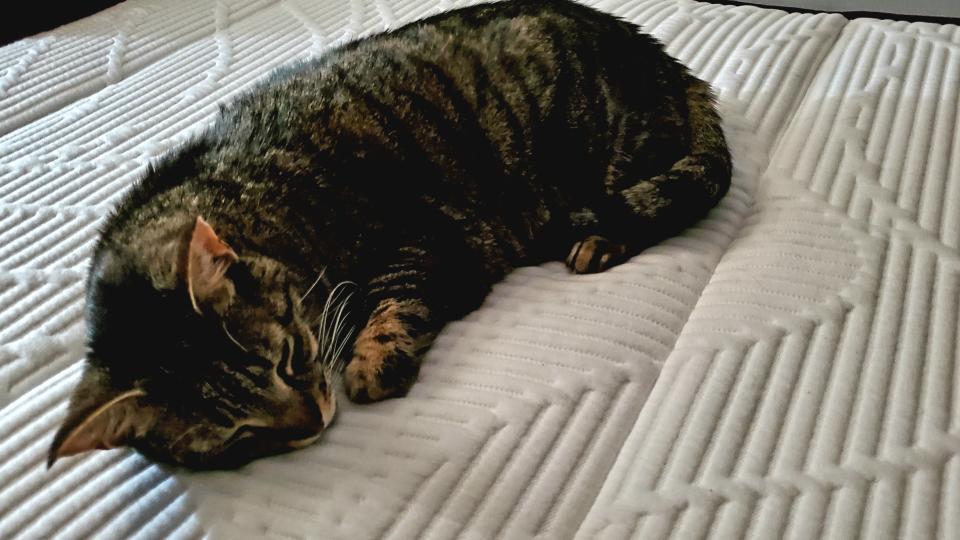
How I tested the Awara mattress
I slept on a twin Awara Natural Hybrid mattress for four weeks in January 2022. Since I tested this mattress during the winter, I cranked my central heating system while layering my pajamas. I dressed the mattress in either 100% cotton or cotton/polyester bed sheets, with a mid-weight polyester comforter on top.
In addition to myself – a 5-foot04, 140lb side/stomach sleeper – I asked five other adults to nap on the Awara mattress for at least 15 minutes in their preferred positions. These testers ranged in size from 5-foot-4 and 126lbs to 6-foot and 215lbs – and one participant was even seven months pregnant at the time.
To supplement my real world experience, I also conducted several standardized tests to objectively gauge the Awara's performance. I used a 50lb weight to evaluate pressure relief and edge support, and a 10lb weight plus an empty wine glass to observe the motion isolation.

